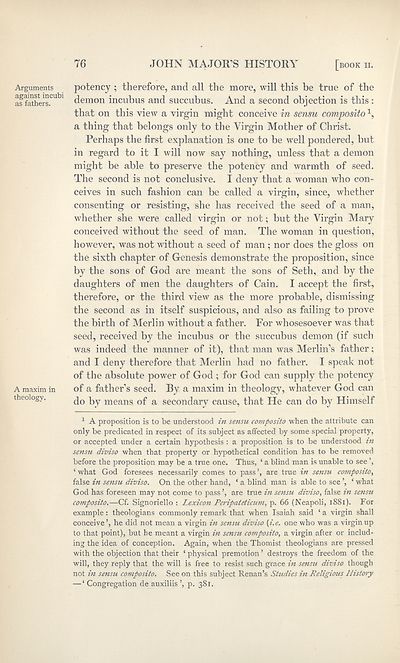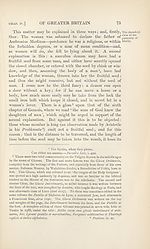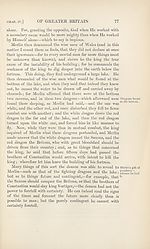Series 1 > History of Greater Britain, as well England as Scotland
(221) Page 76
Download files
Complete book:
Individual page:
Thumbnail gallery: Grid view | List view

76
JOHN MAJOR’S HISTORY
[book II.
Arguments
against incubi
as fathers.
A maxim in
theology.
potency; therefore, and all the more, will this be true of the
demon incubus and succubus. And a second objection is this:
that on this view a virgin might conceive in sensu composite1,
a thing that belongs only to the Virgin Mother of Christ.
Perhaps the first explanation is one to be well pondered, but
in regard to it I will now say nothing, unless that a demon
might be able to preserve the potency and warmth of seed.
The second is not conclusive. I deny that a woman who con¬
ceives in such fashion can be called a virgin, since, whether
consenting or resisting, she has received the seed of a man,
whether she were called virgin or not; but the Virgin Mary
conceived without the seed of man. The woman in question,
however, was not without a seed of man ; nor does the gloss on
the sixth chapter of Genesis demonstrate the proposition, since
by the sons of God are meant the sons of Seth, and by the
daughters of men the daughters of Cain. I accept the first,
therefore, or the third view as the more probable, dismissing
the second as in itself suspicious, and also as failing to prove
the birth of Merlin without a father. For whosesoever was that
seed, received by the incubus or the succubus demon (if such
was indeed the manner of it), that man was Merlin’s father;
and I deny therefore that Merlin had no father. I speak not
of the absolute power of God ; for God can supply the potency
of a father’s seed. By a maxim in theology, whatever God can
do by means of a secondary cause, that He can do by Himself
1 A proposition is to be understood in sensu composito when the attribute can
only be predicated in respect of its subject as affected by some special property,
or accepted under a certain hypothesis : a proposition is to be understood in
sensu diviso when that property or hypothetical condition has to be removed
before the proposition may be a true one. Thus, ‘ a blind man is unable to see ’,
‘what God foresees necessarily comes to pass’, are true in sensu composito,
false in sensu diviso. On the other hand, ‘ a blind man is able to see ’, ‘ what
God has foreseen may not come to pass ’, are true in sensu diviso, false in sensu
composito.—Cf. Signoriello : Lexicon Peripateticum, p. 66 (Neapoli, 1881). For
example: theologians commonly remark that when Isaiah said ‘ a virgin shall
conceive’, he did not mean a virgin in sensu diviso (i.e. one who was a virgin up
to that point), but he meant a virgin in sensu composito, a virgin after or includ¬
ing the idea of conception. Again, when the Thomist theologians are pressed
with the objection that their ‘ physical premotion ’ destroys the freedom of the
will, they reply that the will is free to resist such grace in sensu diviso though
not in sensu composito. See on this subject Renan’s Studies in Religious History
—‘ Congregation de auxiliis ’, p. 381.
JOHN MAJOR’S HISTORY
[book II.
Arguments
against incubi
as fathers.
A maxim in
theology.
potency; therefore, and all the more, will this be true of the
demon incubus and succubus. And a second objection is this:
that on this view a virgin might conceive in sensu composite1,
a thing that belongs only to the Virgin Mother of Christ.
Perhaps the first explanation is one to be well pondered, but
in regard to it I will now say nothing, unless that a demon
might be able to preserve the potency and warmth of seed.
The second is not conclusive. I deny that a woman who con¬
ceives in such fashion can be called a virgin, since, whether
consenting or resisting, she has received the seed of a man,
whether she were called virgin or not; but the Virgin Mary
conceived without the seed of man. The woman in question,
however, was not without a seed of man ; nor does the gloss on
the sixth chapter of Genesis demonstrate the proposition, since
by the sons of God are meant the sons of Seth, and by the
daughters of men the daughters of Cain. I accept the first,
therefore, or the third view as the more probable, dismissing
the second as in itself suspicious, and also as failing to prove
the birth of Merlin without a father. For whosesoever was that
seed, received by the incubus or the succubus demon (if such
was indeed the manner of it), that man was Merlin’s father;
and I deny therefore that Merlin had no father. I speak not
of the absolute power of God ; for God can supply the potency
of a father’s seed. By a maxim in theology, whatever God can
do by means of a secondary cause, that He can do by Himself
1 A proposition is to be understood in sensu composito when the attribute can
only be predicated in respect of its subject as affected by some special property,
or accepted under a certain hypothesis : a proposition is to be understood in
sensu diviso when that property or hypothetical condition has to be removed
before the proposition may be a true one. Thus, ‘ a blind man is unable to see ’,
‘what God foresees necessarily comes to pass’, are true in sensu composito,
false in sensu diviso. On the other hand, ‘ a blind man is able to see ’, ‘ what
God has foreseen may not come to pass ’, are true in sensu diviso, false in sensu
composito.—Cf. Signoriello : Lexicon Peripateticum, p. 66 (Neapoli, 1881). For
example: theologians commonly remark that when Isaiah said ‘ a virgin shall
conceive’, he did not mean a virgin in sensu diviso (i.e. one who was a virgin up
to that point), but he meant a virgin in sensu composito, a virgin after or includ¬
ing the idea of conception. Again, when the Thomist theologians are pressed
with the objection that their ‘ physical premotion ’ destroys the freedom of the
will, they reply that the will is free to resist such grace in sensu diviso though
not in sensu composito. See on this subject Renan’s Studies in Religious History
—‘ Congregation de auxiliis ’, p. 381.
Set display mode to:
![]() Universal Viewer |
Universal Viewer | ![]() Mirador |
Large image | Transcription
Mirador |
Large image | Transcription
Images and transcriptions on this page, including medium image downloads, may be used under the Creative Commons Attribution 4.0 International Licence unless otherwise stated. ![]()
| Scottish History Society volumes > Series 1 > History of Greater Britain, as well England as Scotland > (221) Page 76 |
|---|
| Permanent URL | https://digital.nls.uk/127734417 |
|---|
| Attribution and copyright: |
|
|---|
| Description | Over 180 volumes, published by the Scottish History Society, containing original sources on Scotland's history and people. With a wide range of subjects, the books collectively cover all periods from the 12th to 20th centuries, and reflect changing trends in Scottish history. Sources are accompanied by scholarly interpretation, references and bibliographies. Volumes are usually published annually, and more digitised volumes will be added as they become available. |
|---|


